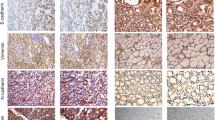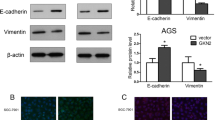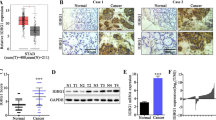Abstract
Gastric cancer (GC) is one of the most common cancers, with most patients often succumbing to death as a result of tumor metastasis. Recent work has demonstrated that gastrin is closely associated with GC metastasis. However, the specific molecular mechanisms underlying this relationship remain to be unveiled. In this study, we assessed the impact of gastrin and the Wnt/β-catenin inhibitor XAV939 on the epithelial-mesenchymal transition (EMT) of the SGC-7901 and MKN45 GC cell lines, and we determined that gastrin-17 significantly decreased E-cadherin expression and upregulated the expression of Snail1 and N-cadherin in GC cells. In addition, gastrin 17 also significantly increased the expression of Wnt3α in a dose-dependent manner. Consistent with these results, gastrin-17 promoted GC cell invasion, proliferation, and migration in a dose-dependent fashion, and these effects were inhibited by XAV939. Together, these results indicated that gastrin-17 induced GC cell EMT, migration, and invasion via the Wnt/β-catenin signaling pathway, which suggests that this gastrin/Wnt/β-catenin signaling axis may represent a therapeutic target for the prevention of GC metastasis.





Similar content being viewed by others
References
Bray F, Ferlay J, Soerjomataram I, Siegel RL, Torre LA, Jemal A (2018) Global Cancer Statistics: GLOBOCAN Estimates of Incidence and Mortality Worldwide for 36 Cancers in 185 Countries. CA: A Cancer Journal for Clinicians 68:394–424
Chen L, Jiang K, Chen H, Tang Y, Zhou X, Tan Y, Yuan Y, Xiao Q, Ding K (2019) Deguelin induces apoptosis in colorectal cancer cells by activating the p38 MAPK pathway. Cancer Manag Res 11:95–105
Greenburg G, Hay ED (1982) Epithelia suspended in collagen gels lose polarity and express characteristics of migrating mesenchymal cells[J]. J Cell Biol 95(1):333–339
Huang J, Xiao D, Li G, Ma J, Chen P, Yuan W, Hou F, Ge J, Zhong M, Tang Y, Xia X, Chen Z (2014) EphA2 promotes epithelial-mesenchymal transition through the Wnt/β-catenin pathWay in gastric cancer cells.[J]. Oncogene. 33(21):2737–2747
Huang J, He Y, Mcleod HL, Xie Y, Xiao D, Hu H, Chen P, Shen L, Zeng S, Yin X, Ge J, Li L, Tang L, Ma J, Chen Z (2017) miR-302b inhibits tumorigenesis by targeting EphA2 via Wnt/ β-catenin/EMT signaling cascade in gastric cancer[J]. BMC Cancer 17(1):886–898
Huber MA, Kraut N, Beug H (2005) Molecular requirements for epithelial–mesenchymal transition during tumor progression. Curr Opin Cell Biol 17:548–558
Jia S, Qu T, Wang X et al (2017) KIAA1199 promotes migration and invasion by Wnt/β-catenin pathway and MMPs mediated EMT progression and serves as a poor prognosis marker in gastric cancer.[J]. PLoS One 12(4):1–16
Kalluri R, Weinberg RA, Kalluri R, Weinberg RA (2009) The basics of epithelial-mesenchymal transition. J Clin Investig 119(6):1420–1428
Li G, Liu JH, Luo J et al (2020) MMPl4 affects the development and progression of gastric cancer by regulating Wnt/β-catenin signalingp. J Med Res 49(2):92–98
Liu J, Zhou J-J, Xie Y, Zhao Y, Zeng Y (2013) Overexpression of gastrin promotes the proliferation, migration and invasion of gastric cancer cells [J]. Chin J Biochem Molec Biol 04:354–360
Mao JD, Wu P, Huang JX, Wu J, Yang G (2014) Role of ERK-MAPK signaling pathway in pentagastrin-regulated growth of large intestinal carcinoma. World J Gastroenterol 20(35):12542–12550
Medema JP (2013) Cancer stem cells: the challenges ahead. Nat Cell Biol 15(4):338–344
Mishra P, Senthivinayagam S, Rangasamy V, Sondarva G, Rana B (2010) Mixed Lineage Kinase-3/JNK1 Ax-is promotes migration of human gastric cancer cells following gastrin stimulation[J]. Mol Endocrinol 24:598–607
Song SJ, Poliseno L, Song MS, Ala U, Webster K, Ng C, Beringer G, Brikbak NJ, Yuan X, Cantley LC, Richardson AL, Pandolfi PP (2013) MicroRNA-antagonism regulates breast cancer stemness and metastasis via TET-family-dependent chromatin remodeling[J]. Cell. 154(2):311–324
Su S, Cong SG, Bi Y et al (2018) Paraquat promotes the epithelialmesenchymal transition in alveolarepithelial cells through regulating the Wnt/β-catenin signal pathWay. [J]. Eur Rev Med Pharmacol Sci 22(3):802–809
Talot LJ, Bhattacharya SD, Kuo PC (2012) Epithelial-mesenchymal transition, the tumormicroenvironment, and metastatic behavior of epithelial malignances. Int J Biochem Mol Biol 3:117–136
Tam WL, Weinberg RA (2013) The epigenetics of epithelial-mesenchymal plasticity in cancer. Nat Med 19:1438–1449
Tan Z, Jiang H, Wu Y, Xie L, Dai W, Tang H (2014) Tang S: miR-185 is an independent prognosis factor and suppresses tumor metastasis in gastric cancer. Mol Cell Biochem 386(1–2):223–231
Tong X, Li L, Li X, Heng L, Zhong L, Su X, Rong R, Hu S, Liu W, Jia B, Liu X, Kou G, Han J, Guo S, Hu Y, Li C, Tao Q, Guo Y (2014) SOX10, a novel HMG-box-containing tumor suppressor, inhibits growth and metastasis of digestive cancers by suppressing the Wnt/β-catenin pathWay.[J]. Oncotarget. 5(21):10571–10583
Torre LA, Bray F, Siegel RL, Ferlay J, Lortet-Tieulent J, Jemal A (2015) Global cancer statistics. 2012. CA Cancer J Clin 65:87–108
Wang D-m, Jian-jiang Z, Xie Y, Yan Z (2013) Objective to study the effect of gastrin on the proliferation and angiogenesis of human umbilical vascular endothelial (HUVE) cell in vitro [J]. Chin J Endocrinol Metab 29(7):598–602
Wang J, Zhou J, Huang F et al (2017) Effect of XAV939 on apoptosis of gastic cancer MKN-45 cells and the mechanism. Chinese. J Exp Surg 34(11):1915–1918
Watson SA, Grabowska AM, El-Zaatari M, Takhar A (2006) Gastrin - active participant or bystander in gastric carcinogenesis. Nat Rev Cancer 6:936–946
Wu AW, Ji JF, Yang H, Li YN, Li SX, Zhang LH, Li ZY, Wu XJ, Zong XL, Bu ZD, Zhang J, Su XQ, Wang Y, Xu GW (2010) Long-term outcome of a large series of gastric cancer patients in China. Chin J Cancer Res 22(3):167–175
Xu J, Lamouille S, Derynck R (2009) TGF-β-induced epithelial to mesenchymal transition[J]. Cell Res 19(2):156–172
Xu W, Chen GS, Shao Y, Li XL, Xu HC, Zhang H, Zhu GQ, Zhou YC, He XP, Sun WH (2013) Gastrin act ing on the cholecystokinin2 receptor induces cyclooxygenase-2 expression through JAK2/STAT3/ PI3K/Akt pathway in human gastric cancer cells[J]. Cancer Lett 332(1):11–18
Yin YF, Grabowska AM, Clarke PA et al (2010) Helicobacter pylori potentiates epithelial mesenchymal transition in gastric cancer: links to soluble HB-EGF, gastrin and matrix metalloproteinase-7.[J]. Gut 59(8):1037–1045
Yuan H, Wang C, Wang Q, Yan Z, Yajie L, Niya L, Jianjiang Z (2017) Influence of blocking gastrin receptor on the proliferation and apoptosis and expression of key proteins in related pathway of gastric cancer cell [J]. Chongqing Med 46(15):2017–2020
Zhang H-J, Zhu J, Liu H-c, Wang H-y, Chen X-f (2009) The research progress of epithelial-mesenchymal transition in tumor invasion and metastasis. Chin Bull Life Sci 21(4):556–559
Zhao JH, Luo Y, Jiang YG, He DL, Wu CT (2011) Knockdown of β-Catenin through shRNA cause a reversal of EMT and metastatic phenotypes induced by HIF-1α.[J]. Cancer Investig 29(6):377–382
Zhao P, Wang C-X, Fang E-H, Wang G-B, Tong Q (2014) Role of epithelial-mesenchymal transition in gastric cancer initiation and progression. World J Gastroenterol 20(18):5403–5410
Acknowledgements
The authors are grateful to the editor, the associate editor, and the reviewer. We thank International Science Editing ( http://www.internationalscienceediting.com ) for editing this manuscript.
Funding
The work was supported by National Natural Science Foundation of China (31660031, 31760328, 31960028), Project of Science and Technology of Guiyang (ZhuKeHe[2017]30-4), Guizhou Science and Technology Innovation Talent Team [2017]5652)
Author information
Authors and Affiliations
Contributions
Yuan Xie and JianJiang Zhou conceived and designed the experiments. YaJie Li, Yan Zhao, Yi Li, XiaoYi Zhang, and Chao Li performed the experiments and analyzed the data. NiYa Long, XueShu Chen, and LiYa Bao gave intellectual advice and revised the manuscript. Yuan Xie and YaJie Li wrote the paper.
Corresponding author
Ethics declarations
The project was approved by the Ethics Committee of The Guizhou Medical University. The authors declare that they have no conflict of interest.
Additional information
Publisher’s note
Springer Nature remains neutral with regard to jurisdictional claims in published maps and institutional affiliations.
Key Points
(1) Gastrin-17 promotes EMT, proliferation, migration, and invasion.
(2) Gastrin-17 activates the Wnt/β-catenin signaling pathway.
(3) Gastrin-17 promotes EMT via the Wnt/β-catenin pathway.
Supplementary Information
ESM 1
(DOCX 17 kb)
Rights and permissions
About this article
Cite this article
Li, Y., Zhao, Y., Li, Y. et al. Gastrin-17 induces gastric cancer cell epithelial-mesenchymal transition via the Wnt/β-catenin signaling pathway. J Physiol Biochem 77, 93–104 (2021). https://doi.org/10.1007/s13105-020-00780-y
Received:
Accepted:
Published:
Issue Date:
DOI: https://doi.org/10.1007/s13105-020-00780-y




